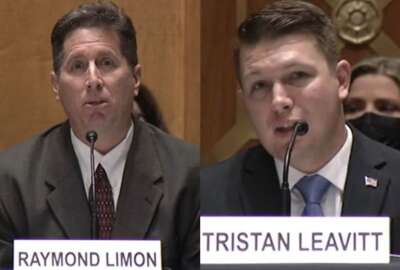

The newly seated board has a backlog of cases, but also some aids to help them get through it.
It took a day to get out into the wild — the revelation that the Senate had, on a voice vote, confirmed two members of the Merit Systems Protection Board. The MSBP has lacked a quorum for five years, or any members at all for two years.
The Senate was oddly furtive. It let the word out on a cloakroom Twitter account.
Equally strange: The Great Deliberators voted on only two of the three nominees: Ray Limon and Tristan Leavitt. Cathy Harris had received tough questioning in hearings from Republican senators about politically charged tweets. Why anyone thinks one’s reputation or credibility is enhanced by Twitter is beyond me. All of this took place while Washington was transfixed by the Ukraine situation and the State of the Union speech. I don’t get that either. I never watch them. Highlights are thoroughly sampled and released, in that White House-media tango, way before speech time. I read the WhiteHouse.gov posting the next morning. I get through it in five minutes and spare myself the manufactured drama.
With respect to the MSPB, you could look at it a couple of ways. In one angle, it’s not such a big deal. Some 3,600 cases have been sitting, waiting for the adjudication by the three-member board. The board hasn’t had a quorum in five years. That averages less than 700 cases a year, of people aggrieved and not satisfied with the decision by an administrative judge. The federal workforce numbers more than two million. Subtract unionized feds and a million, maybe 1.2 million feds have the MSPB as their appeals forum. So 700 isn’t a big number.
On the other hand, the statutes that cover federal employment established the MSPB many years ago. The executive branch is legally obligated to have and operate it. For the executive and the Congress to be so careless about a statutorily-required thing amounts to bad government, to dereliction. Maybe feds shouldn’t have a special appeals panel. Maybe they should. But as long as a piece of government is in place, it should be handled competently. If the government is unfair with 3,600 employees, it’s unfair with its employees.
Here’s an analogy. A famous gigantic retailer that sells everything in the universe online and whose founder flies in space just opened a high-tech grocery store in the very building that houses Federal News Network. Nice store, nice staff. But the self-service coffee drink machine has been out of order on my last three visits. Now, this store is under no constitutional requirement to offer me $1.99 cappuccinos. But if they do put the machine there, by gosh, keep it running.
So the MSPB doesn’t process the volumes of cases on the scale of the Social Security disability apparatus or Veterans Affairs. But real people get ground up in the vast bureaucracy of the federal government. These people genuinely believe, and in fact often are, treated wrongly with pay cuts or firing.
I heard from one such person the other day, someone fired a few years back from an agency with a continuous history of poor labor relations, with both bargaining unit and non-union employees. He figures his MSPB appeal is somewhere in the middle of that stack of cases.
When will it get to the top of the stack?
When they’re sworn in and get to work, Limon and Leavitt will face a climbing wall’s worth of cases. But like a climbing wall, the backlog will come with the equivalent of toe holes, protrusions and grips to help them up.
Specifically, each case file will be affixed with a summary and recommended decision. These have been prepared by the staff attorneys in the Board’s office of appeals counsel. The two members are free to accept the recommendation, reject it, rewrite it, or ask the staff to do more digging.
Former MSPB member Mark Robbins told me, none of this absolves the new members from the need to at least glance through the files themselves. They need to decide for themselves, not rubber stamp staff opinions. Still, the process will go faster than it would without the summaries and recommendations, the members having to dig in cold.
Two other points favoring a relatively rapid disposition of the backlog. Now-member Leavitt has worked for several years as the MSPB general counsel. He has institutional, legal and procedural experience. And a third of the cases will have Robbins’ decisions attached for guidance. They’re moot because Robbins toiled as the sole member before his term expired two years ago. But they do represent a piece of qualified work the new members can use.
As of 2019, 50 books in existence were alleged to be bound in human skin. Out of those, 31 have been tested, and 18 were confirmed to be human.
Source: The Anthropodermic Book Project
Copyright © 2025 Federal News Network. All rights reserved. This website is not intended for users located within the European Economic Area.
Tom Temin is host of the Federal Drive and has been providing insight on federal technology and management issues for more than 30 years.
Follow @tteminWFED


